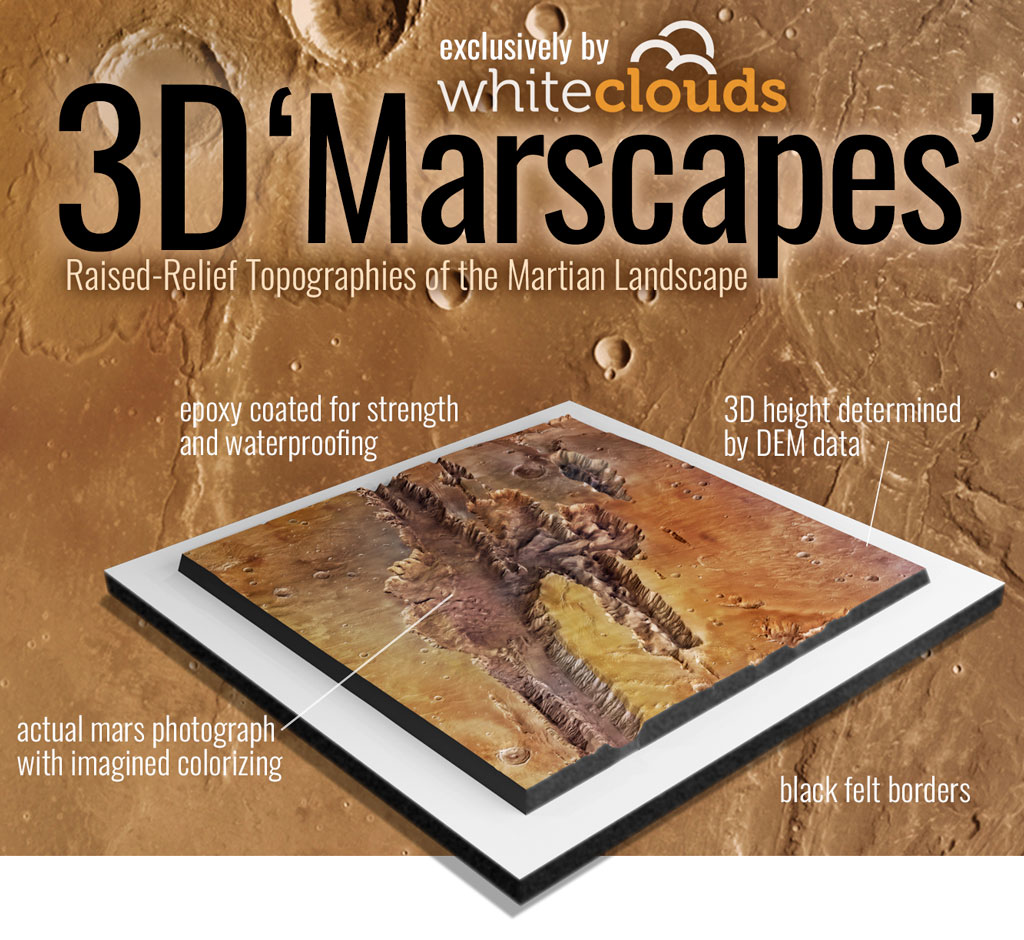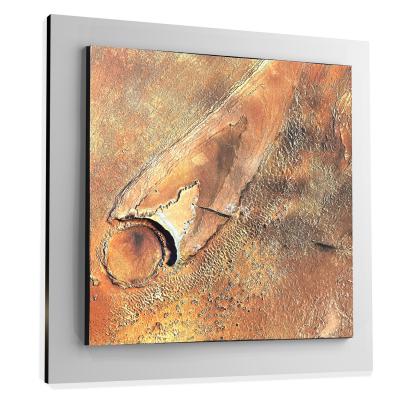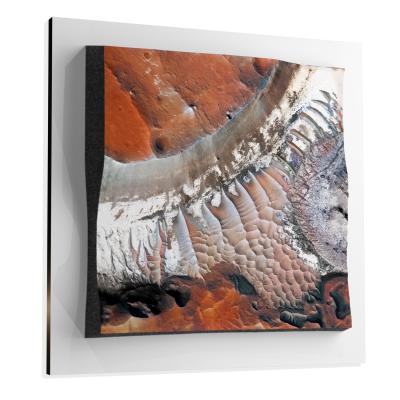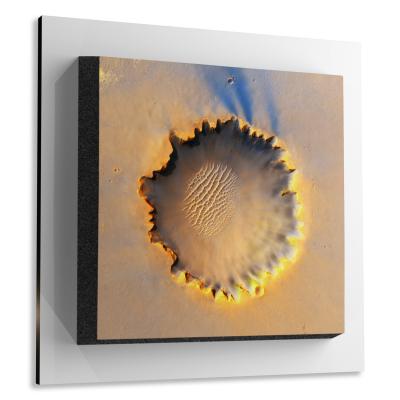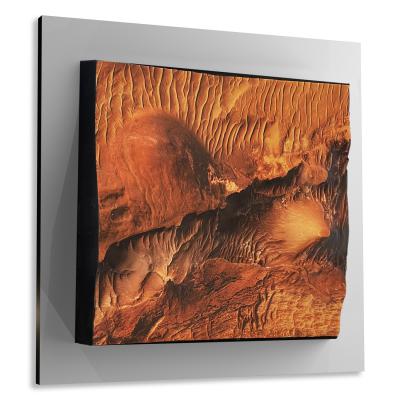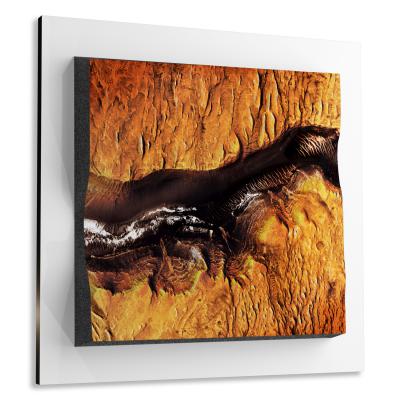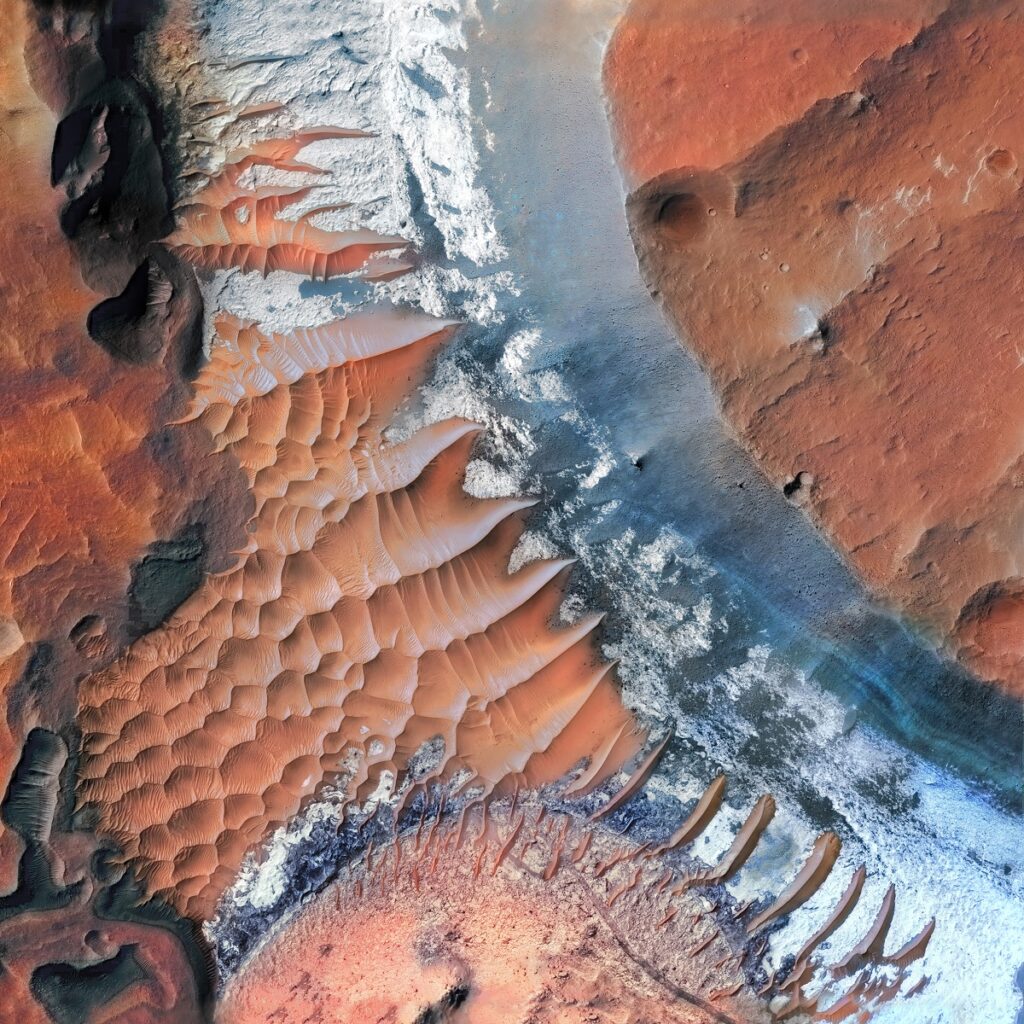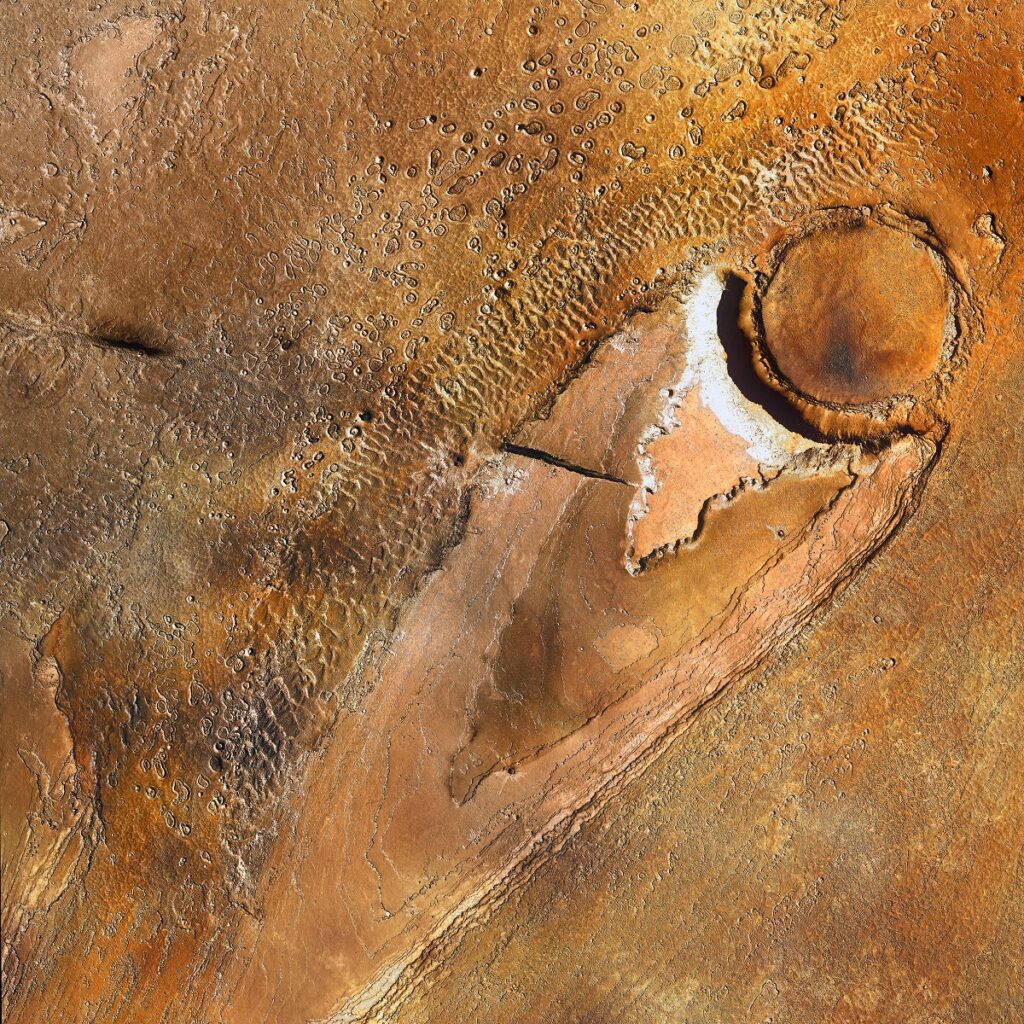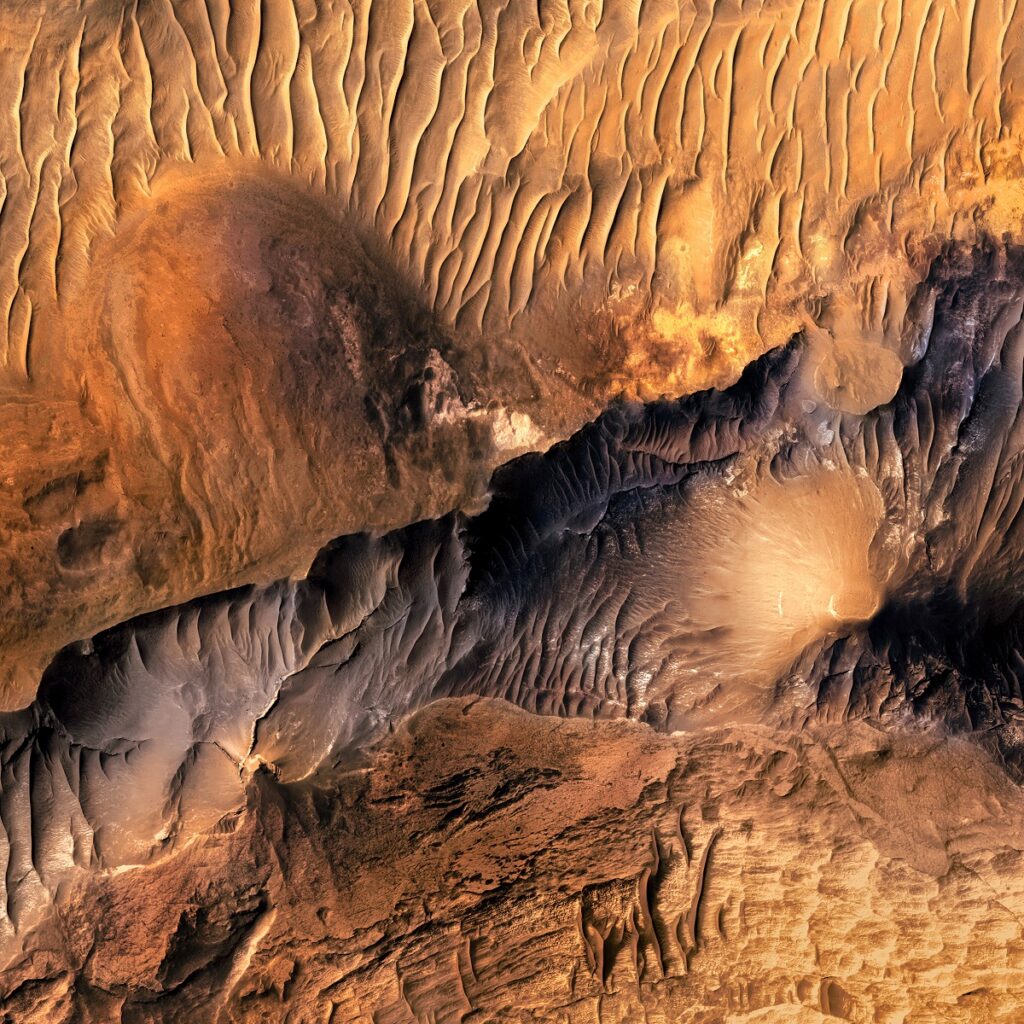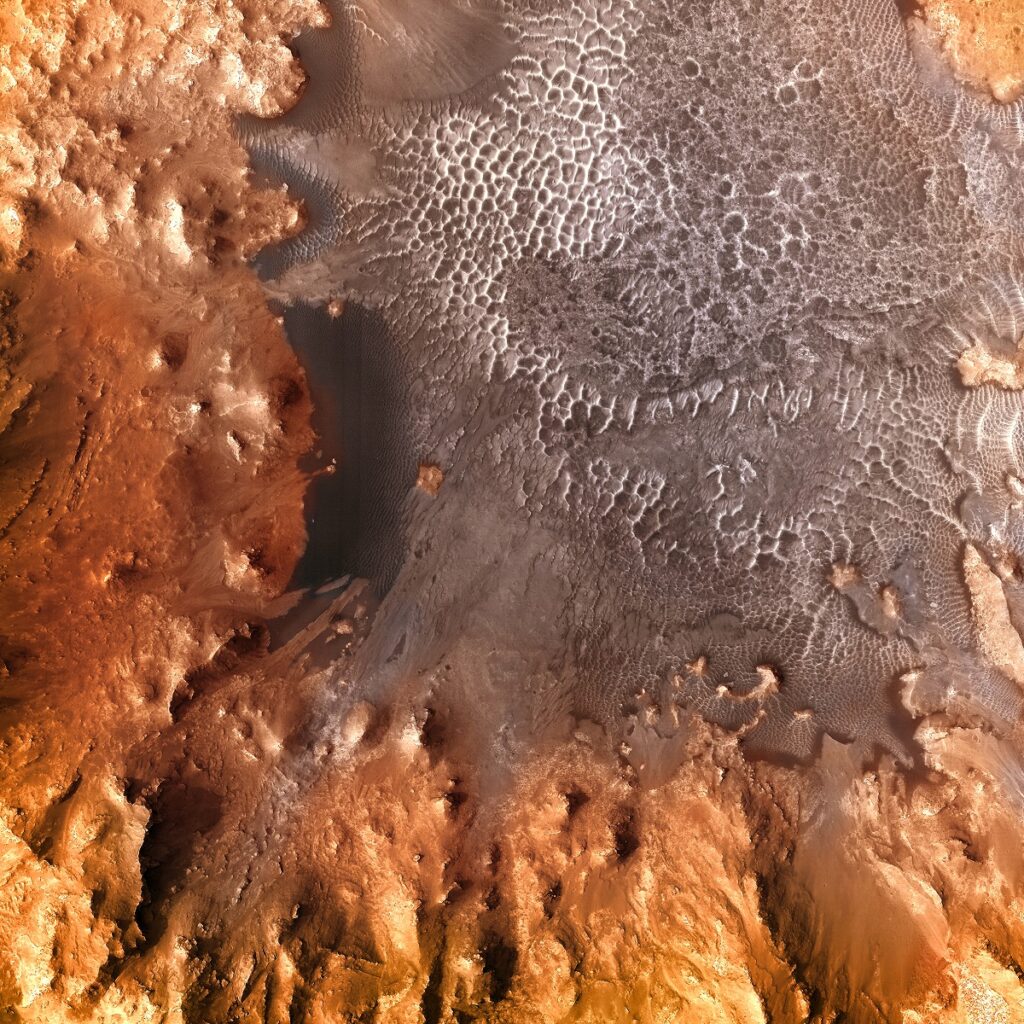Aram Chaos
Aram Chaos
We Build Custom 8K Mars Canvas Prints of Aram Chaos
Did you know we make
custom
8K Mars Canvas Prints
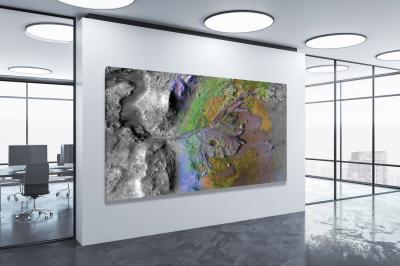
and
3D Marscapes
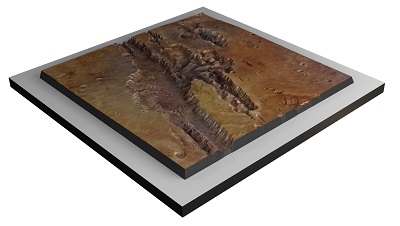
Aram Chaos
Aram Chaos represents one of the most compelling geological formations on Mars, offering tantalizing insights into the Red Planet’s complex history. This report aims to delve into the mysteries surrounding Aram Chaos by examining its geographical location, geological makeup, significant discoveries, scientific missions that have studied it, and its various geomorphological features.
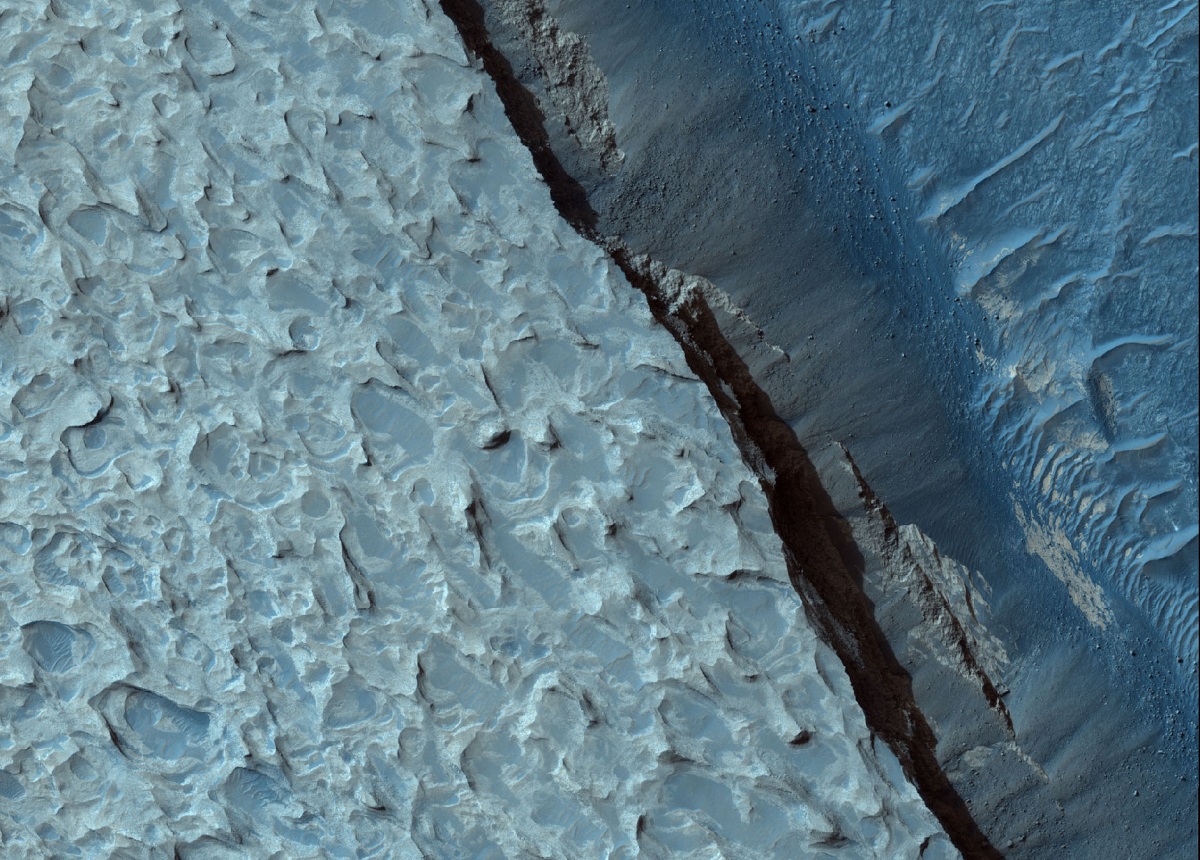 Sulfates in Aram Chaos
Sulfates in Aram Chaos
Geographical Location
Aram Chaos is prominently situated in Mars’ equatorial belt, specifically at coordinates of approximately 2.6 degrees North latitude and 21.5 degrees West longitude. It sprawls across an extensive land area with an estimated diameter of approximately 280 kilometers. Adjacent to Aram Chaos to the west is the awe-inspiring Valles Marineris, a colossal canyon system that dwarfs even the Grand Canyon on Earth and holds the title of the largest canyon system within our solar system. To its perimeter lies Ares Vallis, a substantial outflow channel that exhibits signs of having been carved by catastrophic flood events in the Martian past. Aram Chaos is a compelling illustration of collapsed terrain, a feature often seen on Mars, but particularly impressive in this location. While widely considered to be an ancient impact crater, it’s evident that Aram Chaos has undergone significant geological transformations, likely due to a combination of erosional processes and tectonic activities. Its fortuitous geographical location, nestled between these notable geological landmarks and situated at the planet’s equator, makes Aram Chaos an invaluable subject for in-depth studies that seek to decode Mars’ geological and climatic evolution.
Advertisement
Sample Marscapes
Geological Composition
Aram Chaos is a geological treasure trove, teeming with a bewildering array of mineral compositions that collectively tell the tale of Mars’ turbulent history. Spectroscopic investigations have been largely carried out by space missions like the Mars Reconnaissance Orbiter and Mars Express orbiter. These have revealed an astonishingly intricate mineral composition, comprising sulfates, hematite, and a myriad of clay types. Sulfates are particularly indicative of past environments that were both acidic and saturated with water. Hematite, on the other hand, hints at milder, possibly neutral, aquatic conditions. The complex assemblage of minerals strongly bolsters the theory that Aram Chaos was once a hub of water-related activity. This water activity may have ranged from standing lakes to potentially extensive seas. The site is best known for its iconic chaos terrain—a dramatically collapsed and fractured surface characterized by mesa-like blocks separated by valleys. These have likely formed through a dynamic interplay of erosional forces, tectonic activities, sublimation of underground water ice, and even ancient lake drainage systems.
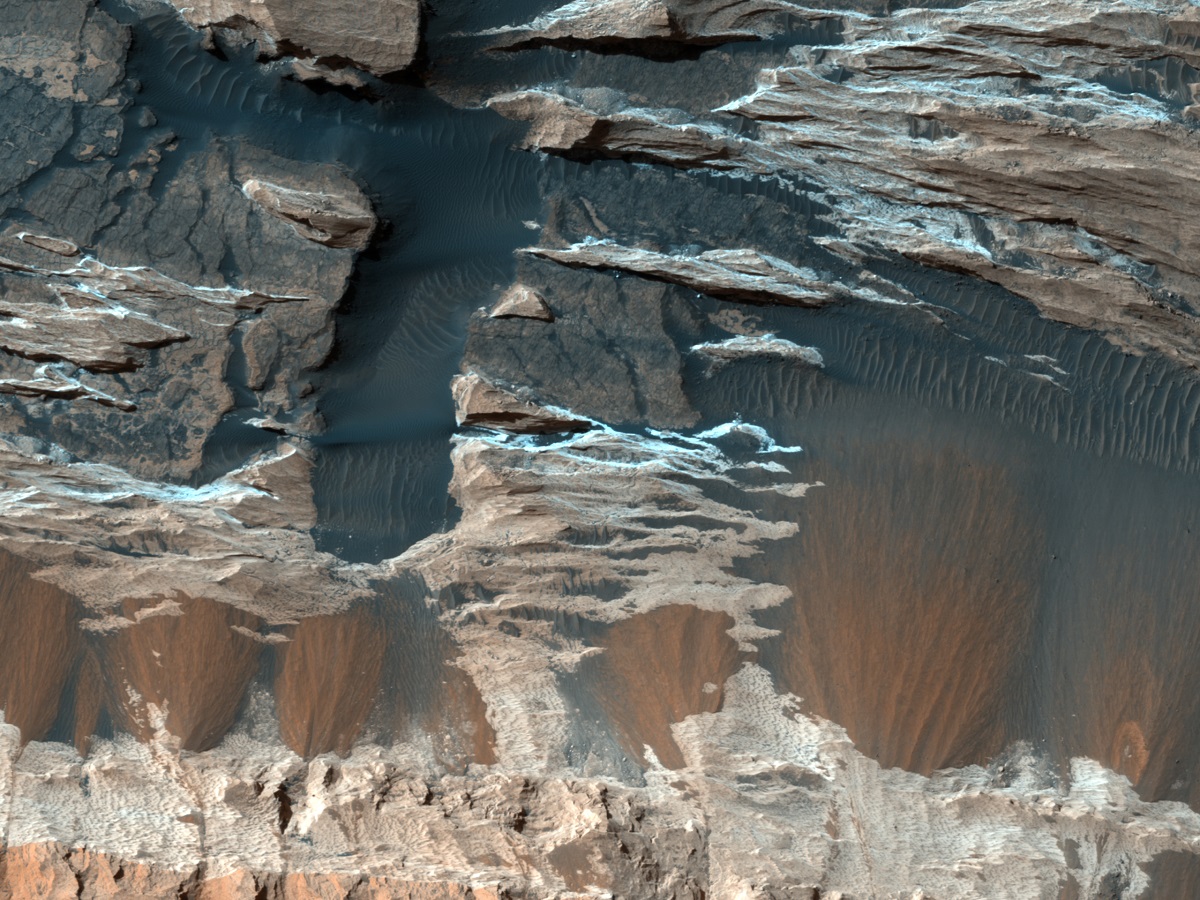 Gully Landforms in Aram Chaos
Gully Landforms in Aram Chaos
Significant Discoveries
Evidence of Water Reservoirs
Aram Chaos has been a hotbed for groundbreaking discoveries, none more striking than the compelling evidence for large, subterranean water reservoirs in the past. The unique structure of the collapsed terrains, coupled with the mineralogical makeup that includes water-altered minerals, strongly suggests that this Martian region once harbored extensive amounts of frozen water beneath its surface.
Layered Terrains
Further enriching its geological tapestry are the intricately layered terrains that Aram Chaos flaunts. These layers are likely sedimentary in origin, having been deposited over vast stretches of time, and they open a new frontier in our understanding of Mars’ geological and possibly hydrological cycles. The layers suggest periods of stability where standing bodies of water could have existed, making them a focal point for studies on Mars’ climatic past.
Diversity of Minerals
The mineralogical kaleidoscope found in Aram Chaos offers a tantalizing glimpse into the Red Planet’s diverse geological and environmental history. The presence of such a broad spectrum of minerals not only highlights the complex geological processes that have been at play over millions of years but also renders Aram Chaos a high-priority target for astrobiological studies, as these varying environmental conditions could have implications for the planet’s habitability.
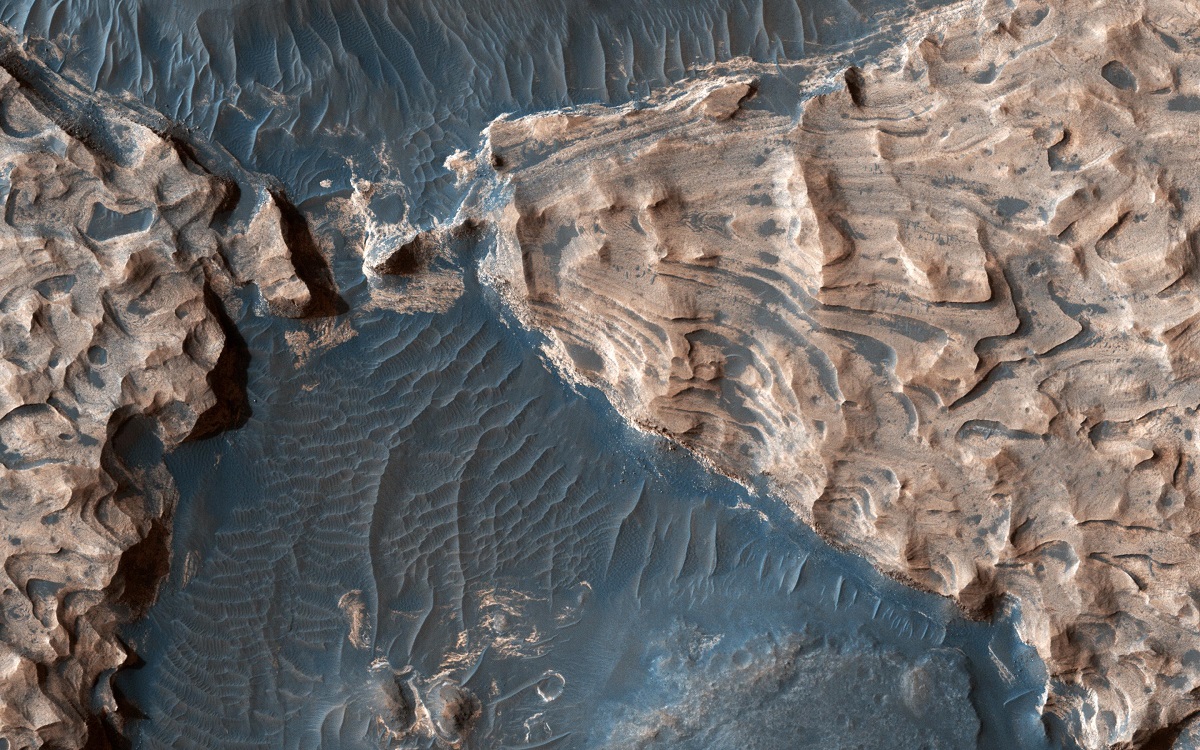 Aram Chaos, a 280 kilometer-diameter ancient impact crater that lies within in the Southern Highlands
Aram Chaos, a 280 kilometer-diameter ancient impact crater that lies within in the Southern Highlands
Scientific Missions
Mars Reconnaissance Orbiter (MRO)
The MRO has had a profound impact on our current understanding of Aram Chaos. Its state-of-the-art imaging technology has been crucial for obtaining high-resolution photographs that have, in turn, allowed scientists to identify specific mineral compositions and evaluate the region’s complex topographical features in unprecedented detail.
Mars Express
The Mars Express mission, a project led by the European Space Agency, has been another critical player in the exploration of Aram Chaos. Its cutting-edge spectroscopic instruments have provided essential data in identifying the various minerals, thus confirming many hypotheses about the region’s geological and environmental history.
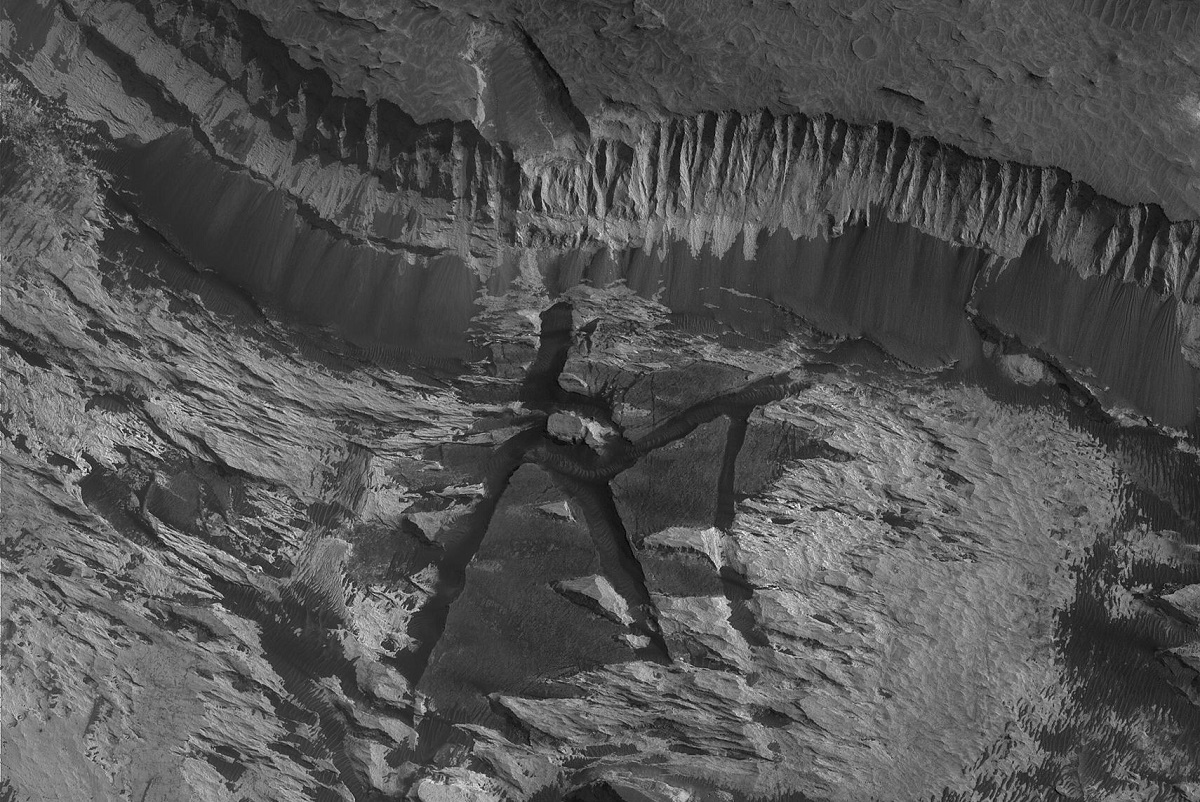 Aram Chaos Complexity
Aram Chaos Complexity
Future Missions
Aram Chaos is very much on the radar for upcoming scientific missions to Mars. Given its abundant, intriguing geological and hydrological features, as well as its potential relevance for astrobiology, it is considered a prime candidate for future rovers, landers, and even possible manned missions that aim to explore the Red Planet’s surface in greater depth.
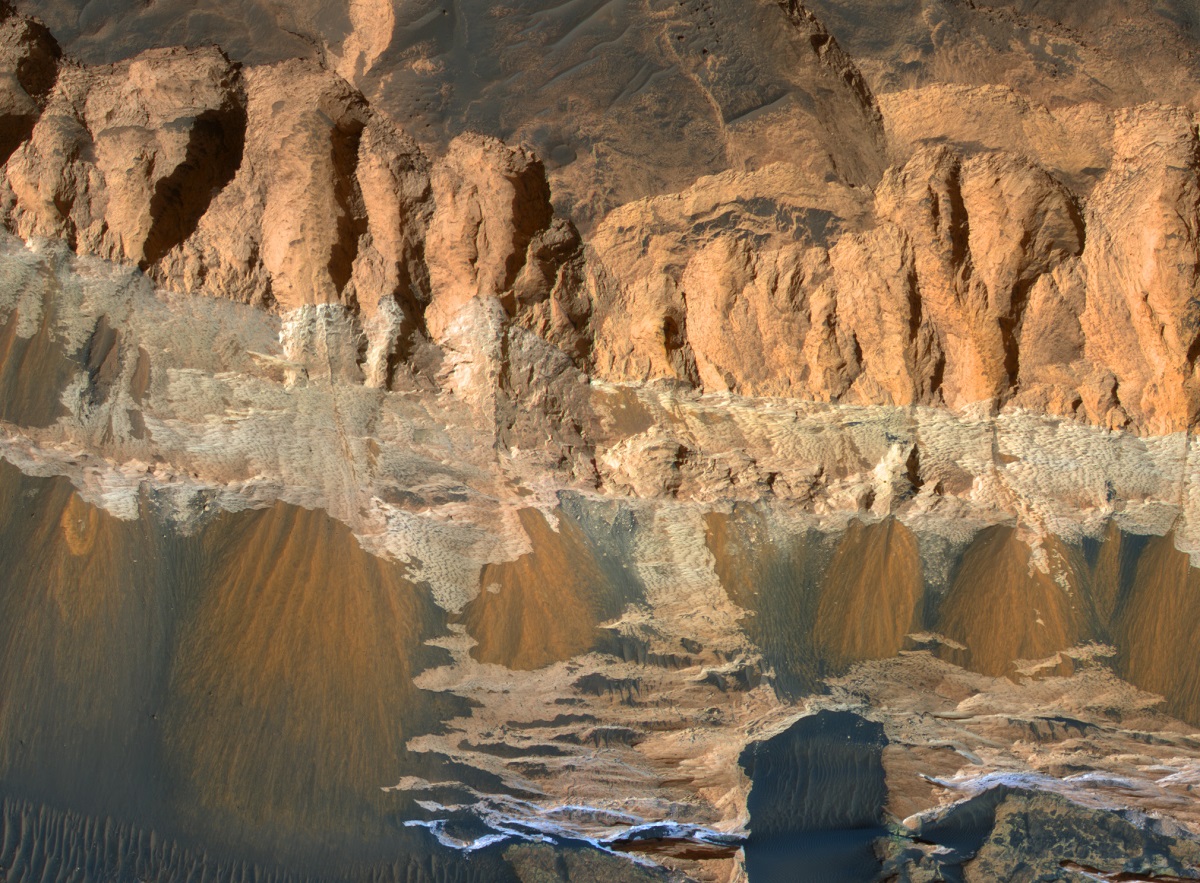 Badlands of Aram Chaos
Badlands of Aram Chaos
Geomorphological Features
Aram Chaos stands as a veritable playground for geomorphologists, with its diverse and puzzling array of surface features. Most conspicuous among them is its ‘chaos terrain,’ a sprawling expanse of collapsed and fractured landforms that seem almost otherworldly. These are complemented by mesa-like blocks, some of which stand at varying elevations, and valleys carved intricately into the landscape. This chaotic terrain could be the result of several erosional processes acting in concert over millennia. Moreover, the presence of channel-like features within Aram Chaos also suggests that water, whether in past or transient form, has played a significant role in shaping this captivating Martian landscape.
Aram Chaos serves as a multifaceted window into the diverse and dynamic geological history of Mars. From its distinct mineral composition to its iconic chaos terrains, it offers tantalizing clues into a range of environmental conditions and processes—most notably, the significant role that water likely played. The data collected from past and potential future missions to Aram Chaos promise to significantly advance our understanding of Mars, both as a planetary body and, perhaps, as a former host of life—making it one of the most fascinating features on the Martian surface to date.
More About Mars
Contact us today to learn more about our 3D services and how we can help you achieve your goals.
